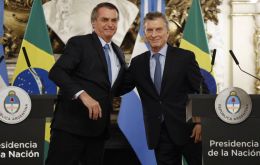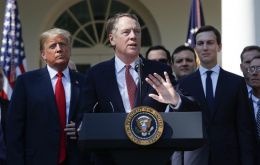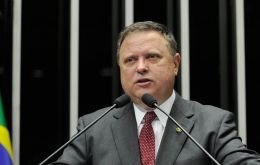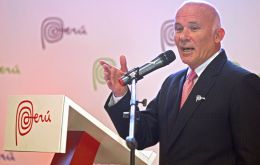MercoPress. South Atlantic News Agency
Tag: Trade deal
-
Friday, June 7th 2019 - 09:59 UTC
Bolsonaro and Macri announce the EU/Mercosur trade deal is “imminent”

The presidents of Argentina and Brazil said on Thursday that an agreement is imminent on a free trade agreement between the European Union and Mercosur. Brazil's President Jair Bolsonaro and Argentina's Mauricio Macri expressed confidence that the deal would soon be signed as they met in Buenos Aires for talks.
-
Wednesday, June 5th 2019 - 09:37 UTC
Trump bets strongly on Brexit and anticipates a “phenomenal trade deal” with UK

United States President Donald Trump emerged from a meeting on Tuesday with outgoing British Prime Minister Theresa May talking up a “phenomenal trade deal” between the two countries once the United Kingdom leaves the European Union. But he also hinted that any such deal would have to include opening up Britain's cherished National Health Service (NHS) - a proposition certain to stir controversy.
-
Wednesday, May 8th 2019 - 09:08 UTC
Asian markets plummet on concern over China/US trade deal; Beijing negotiator expected in Washington

A red wave swept across Asia trading floors on Wednesday as investors grow increasingly concerned that the China-US trade deal, which appeared all by ready to sign, could fall through.
-
Monday, May 6th 2019 - 09:54 UTC
US-China trade talks moving “too slowly” Trump warns and announces a Friday deadline

Donald Trump has said he will raise tariffs on US$ 200bn of Chinese goods because talks on a US-China trade deal are moving “too slowly”. The US president tweeted that tariffs of 10% on certain goods would rise to 25% on Friday, and US$ 325bn of untaxed goods could face 25% duties “shortly”.
-
Thursday, October 18th 2018 - 08:42 UTC
US determined to a trade deal with the UK, “as soon as it is ready” after Brexit

The United States administration has formally confirmed it intends to pursue a trade deal with the UK “as soon as it is ready” after leaving the EU. Donald Trump’s trade representative Robert Lighthizer notified Congress of plans to open negotiations with the UK, as well as with the EU and Japan.
-
Monday, June 4th 2018 - 08:57 UTC
Trade deal falls warns China, if US insists with imposing more tariffs

China said on Sunday it wouldn’t step up its purchases of United States products if President Donald Trump goes ahead with his threat to tax billions of dollars’ worth of Chinese imports. White House advisers insisted on fundamental changes in ties between the world’s two biggest economic powers.
-
Friday, May 25th 2018 - 08:56 UTC
Brazil agriculture fears consequences of a US/China trade understanding

The trade dispute between the United States and China has benefited Brazil so far but could prove harmful long term as higher grain prices will make the country’s exports less competitive, Brazil’s farm minister said. Brazil is the world's leading poultry exporter.
-
Monday, February 19th 2018 - 08:53 UTC
Peru and Australia sign trade deal, which opens market for Aussie farm produce

Australia and Peru have signed a new trade deal that is expected to lead to more local products - including beef, sugar, almonds and dairy - being sold in nation which is a full member of the Pacific Alliance.
